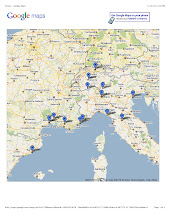In his closing statements, Professor Taylor advised us to be the people in the institutions we want to believe in. Contrastingly, one of the speakers at the council of Foreign Relations said that if given the choice to believe in institution or people choose the institution. I began to evaluate how this applied to Argentina as well as what I believe is most successful.
Latin America has a history of "uneven enforcement" (Democracy 269) of law to say the least. Argentina has a history strewn with corruption and selfish leaders and there is still reason for distrust with the corruption even up through the elections today. Their history in the most recent century included fourteen military presidents in the years 1930-1983 (Argentine Democracy 3) and the removal of multiple presidents, legislators, and judges. For Argentina, the the inability to trust institutions is based on the institutional weakness of the country as a whole. As explained in Argentine Democracy, the lack of compliance with law and recourse for those exploited by violations are the stems to this lack of trust in the government. Though there is a formal constitution, the lack of stability and adherence, coupled with frequent changes, remove the strength it could hold with formality. State officials were notorious for acting out of self-interest and disregard for the people ranging from ruthless abuse of human rights, shuffling of money to specific people, or announcing to run for a position with no intention of accepting. The people of Argentina have been unable to trust that the positions of authority would be held to the obligatory standard due to the effort by the government to manuever its way around inconventient rules. After being taken advantage of, killed, kidnapped, or exploited who could blame them. An added cause to the lack of trust comes from the lack of recourse taken to combat the corruption. This is one of the central reasons why this lack of trust has not changed and will continue to have a hard time changing. As the US Embassy representatives explained, the bright young people looking to change the country do not want to go into politics because they will be assumed immoral by profession. The judicial system is set up to formally model our system but it is rarely implemented in the way it was intended with massive delays in hearings, slow proogression in trials, and corrupt rulings. Argentines are forced to resort to the press to punish leaders instead of the court system. This does not change the institutions but forces them to be more subtle or sneaky. Argentina is constantly looking for someone to trust. This can be seen in the rapid rise and fall in popularity for any politician, coach, or player. They want someone to meet their expectations.
I personally believe there must be a combination of trust in both the individual and the institution. A person by themselves doesn’t have the credibility or power to bring change. Contrastingly a position is a shell and doesn’t have the charisma and personality to gain trust either. I believe that Argentina needs to elevate someone who can restore trust in the positions so long doubted. Just as Kirchner attempted to accomplish his political goals while strictly following the appropriate process (Democracy 44) leaders to follow can do the same and gradually elevate confidence for the institutions. There needs to be continual encouragement of the people to use the courts to uphold justice and perform according to its responsibilities. Greater national stability in all facets comes when there is some trust restored in the institution. As a politician there is now way everyone will be happy all the time, but having restored the lost respect for a position will allow the people to trust that they are not being used and decisions are made to benefit the nation as a whole. The respect for an institution combined with a leader people can believe will allow Argentina to be successful in accomplishing greater stability long term.
Summer 2010
Europe May 16- June 2
Itinerary
With Tyler
VeniceBarcelona
AvignonNice
Cannes
Monaco
Cannes
Monaco
With Ben
Milan
Lake Como
Florence
Cinque Terre
Zermatt
Interlaken
Zurich
Friday, May 29, 2009
Subscribe to:
Post Comments (Atom)


No comments:
Post a Comment